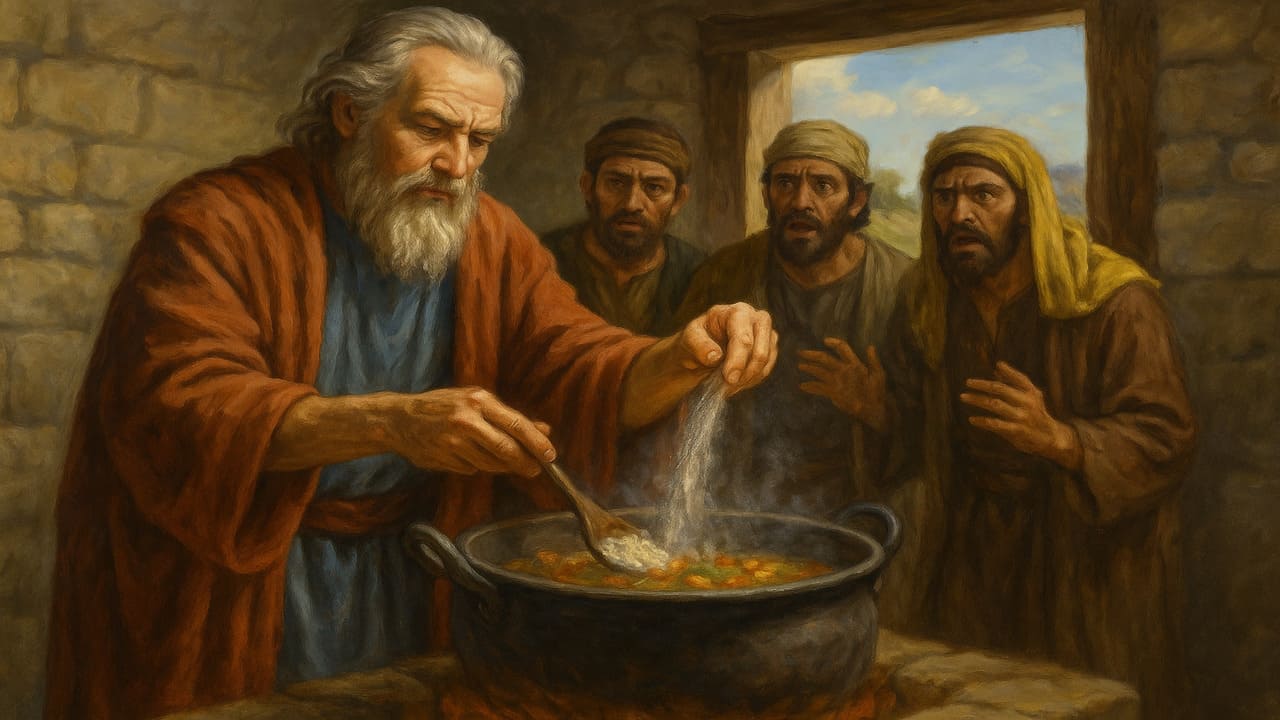
Thorn Ville Church – Among the many dramatic episodes in the Old Testament, some stories capture the imagination with their grandeur parting seas, fiery chariots, and miraculous healings. Yet, hidden within these well-known narratives are smaller, quieter miracles that offer profound insight into God’s provision and the role of The Prophet. One such account is the unusual and often overlooked miracle of Elisha and the poisoned stew, found in 2 Kings 4:38–41.
This short but vivid passage takes place during a time of famine and scarcity. The people are hungry, resources are limited, and tensions run high. But within that desperation, we see a quiet miracle unfold, revealing God’s care for His people in moments of daily survival not just in epic battles or prophetic declarations.
The setting is simple yet grim: the land is suffering from a famine, and Elisha has returned to Gilgal, where a group of The Prophet likely students or followers under his guidance has gathered. These were not wealthy or powerful men; they were spiritual apprentices, dependent on God and each other for survival.
In an attempt to feed the group, one of the men goes out to gather herbs and finds wild gourds from an unfamiliar vine. He cuts them up and adds them to a pot of stew, unaware that they are poisonous. Soon after, the men begin to eat and quickly realize something is terribly wrong. They cry out in panic:
“Man of God, there is death in the pot!”
(2 Kings 4:40, NIV)
Also Read : How Music Impacts Our Emotional State, Fosters Memories, and Influences Daily Habits
What follows is neither showy nor theatrical. Elisha doesn’t panic. Instead, he tells them to bring some flour. He throws the flour into the pot and instructs them to eat again. Miraculously, the stew is safe, and the people are nourished. The poison is gone.
It’s easy to read past this moment. There are no thunderclaps, no fire from heaven. But this miracle speaks volumes. In a moment of real danger food poisoning during famine could have meant multiple deaths Elisha acts with simple faith and divine authority. The flour itself has no medicinal properties to neutralize poison; it’s not the ingredient, but the intervention of God through The Prophet that brings healing.
Though short, the story reveals several timeless truths:
Also Read : The Servant Girl Who Spoke Up: How Naaman Found Healing Through a Slave’s Faith
The poisoned pot is just one of many subtle but powerful miracles in the ministry of Elisha. While many remember the parting of the Jordan or the healing of Naaman, stories like this one show the prophet ministry of provision how he cared for widows, multiplied oil, and fed crowds long before Jesus performed similar acts.
If we look closer, we find that Elisha’s miracles often meet immediate human needs. He does not just prophesy; he actively steps into problems and solves them, often in domestic or humble settings. From resurrecting a child to making an iron axe head float, Elisha’s miracles were deeply practical meeting people where they were, not where the world expected grandeur.
In a world overwhelmed by grand narratives, global news, and massive movements, the story of Elisha and the poisoned pot reminds us to look for God in the small things. The miracle didn’t make headlines, but it saved lives. It didn’t come with spectacle, but it came with meaning.
God still works in subtle ways healing quiet wounds, restoring overlooked situations, and showing up in kitchen tables as much as in thrones. Elisha’s simple response invites us to recognize the sacred in the ordinary, and to trust that even our smallest crises are worthy of heaven’s attention.
Thornville Church - Your Source for Biblical Inspiration - numerous hidden christian heritage sites worth discovering remain off the beaten…
Thornville Church - Your Source for Biblical Inspiration - symbols and artifacts found in early church structures reveal much about…
Thornville Church - Your Source for Biblical Inspiration - The story of Daniel in the Lion’s Den remains a powerful…
Thornville Church - Your Source for Biblical Inspiration - Early christian sacred spaces have left a lasting cultural impact that…
Thornville Church - Your Source for Biblical Inspiration - haunted locations featured horror games have become central to the spine-chilling…
Thornville Church - Your Source for Biblical Inspiration - church symbols and icons hold profound significance in Christian worship, serving…